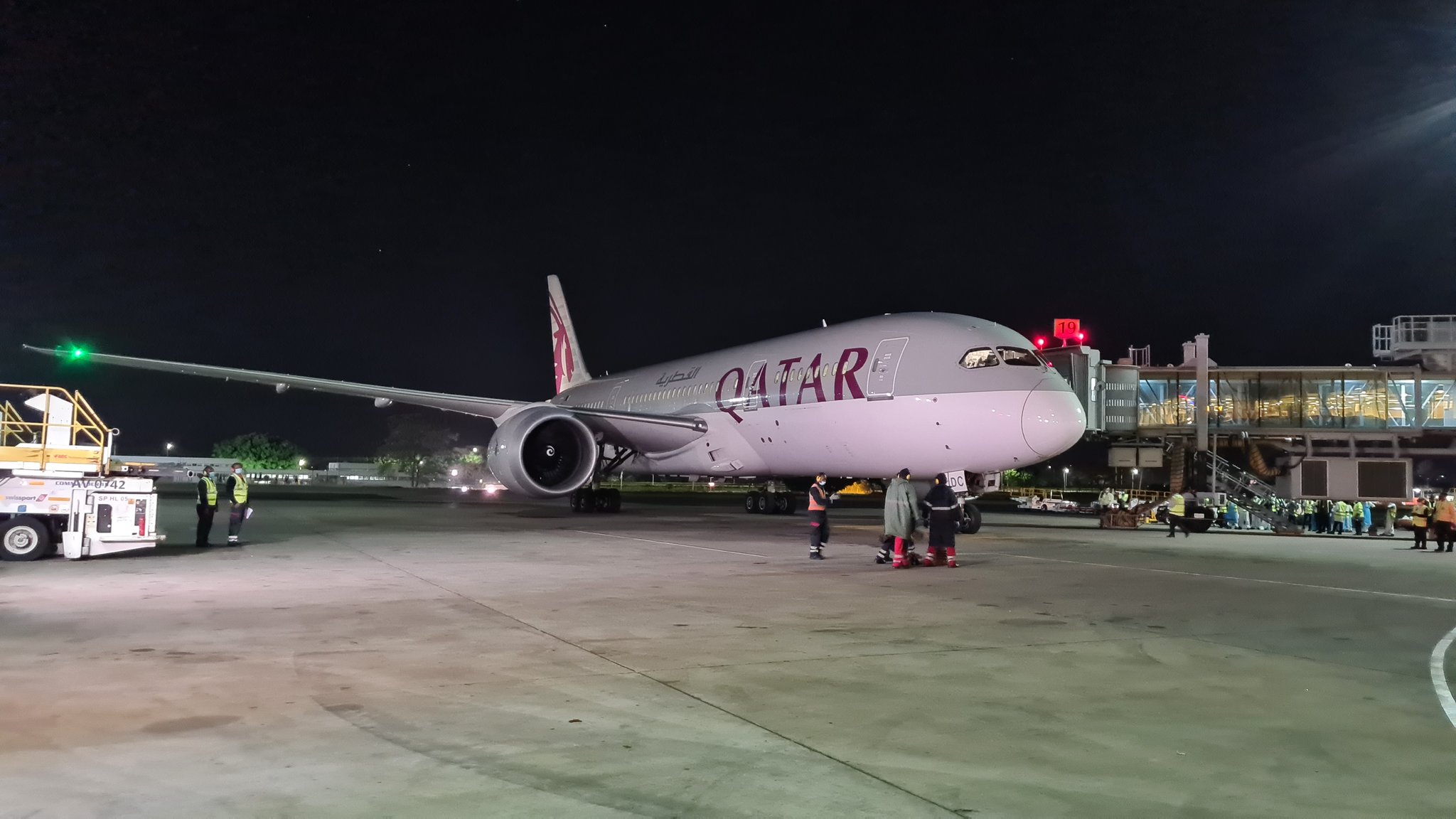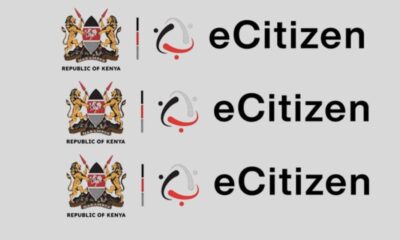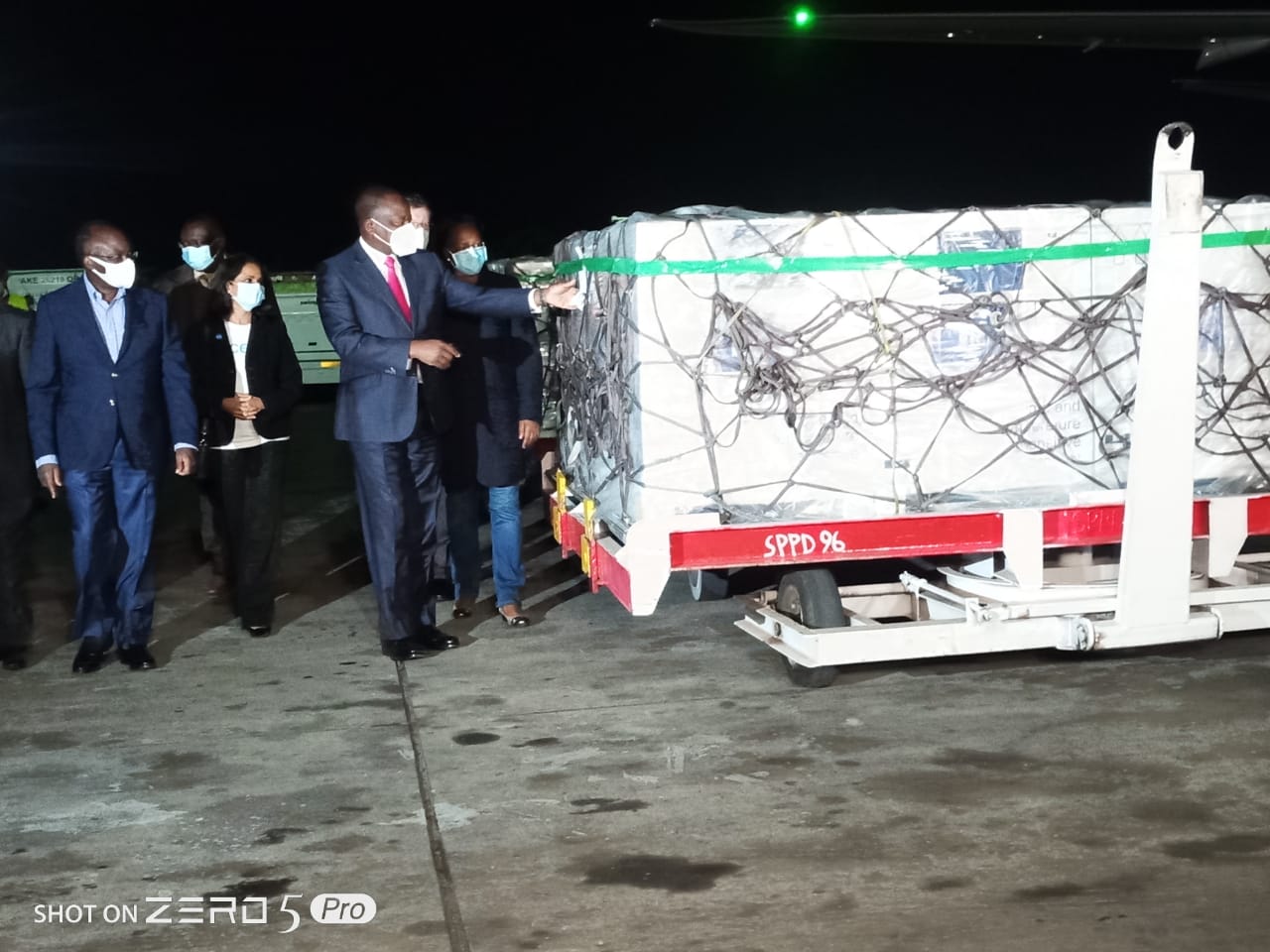Coronavirus
COVID-19 Vaccines Finally Arrived In Kenya

The country is set to launch a national immunization campaign following the arrival of the much-awaited coronavirus vaccines.
The fight carrying the 1.02 million doses under the Vaccines Global Access (COVAX) program landed at the Jomo Kenyatta International Airport (JKIA) shortly before mid-night. The consignment was received by top government officials led by Health Cabinet Secretary Mutahi Kagwe, Transport CS James Macharia and CS Margaret Kobia.
The vaccines arrived at the JKIA Tuesday night aboard a Qatar Airways flight QR1341.
While addressing the media, Health Cabinet Secretary Mutahi Kagwe termed the arrival of the vaccines as “exciting moment for our nation” saying that the country had been fighting the virus with rubber bullets.
“This is an exciting moment for our nation. We are excited about the particular event which is receiving the vaccines country. We have been fighting the virus with rubber bullets,” he said excitedly.
“The war has changed. This is a game changer on the war on Covid-19 disease in the country,” he said.
Kagwe noted that the vaccination will be a voluntary process adding that the WHO has advised countries to have a third of their populations vaccinated.
CS Kagwe said that the Health Ministry will roll out of the vaccines which will begin with the regional hospitals and level 2 hospitals.
The Ministry of Health expects to vaccinate over 15 million Kenyans from the virus.
Top on the list of those who have been lined up the receive the jab during the roll out of the inoculation program are front-line workers, who will include the teaching and non-teaching fraternity, the uniformed forces and the immigration officers.
According to the Health CS, the 1.02 million doses will be the first batch of the 4.1 million expected in Kenya, with the country ultimately planning to import 24 million doses.
The Ministry of Health has already initiated discussions with the National Treasury that could see funds availed to procure freezers that will store the vaccine at -70°C.
Sources also indicate that the ministry intends to extend request for additional funds for vaccine storage facilities that can achieve -20 degrees Celsius and store up to 20 million vials.
What you need to know about AstraZeneca Vaccine
Last month, the World Health Organization (WHO) Strategic Advisory Group of Experts on Immunization (SAGE) issued interim recommendations for use of the Oxford/AstraZeneca COVID-19 vaccine (AZD1222).
Those aged above 18 years can be administered the vaccine including those aged 65 and above.
While the vaccine supplies are limited, it is recommended that priority be given to health workers at high risk of exposure and older people.
The vaccination is also recommended for persons with comorbidities (presence of two or more diseases in a patient) that have been identified as increasing the risk of severe COVID-19, including obesity, cardiovascular disease, respiratory disease and diabetes.
Vaccination can be offered to people who have had COVID-19 in the past.
Vaccination can be offered to breastfeeding women if they are part of a group prioritized for vaccination. WHO does not recommend discontinuation of breastfeeding after vaccination.
While pregnancy puts women at higher risk of severe COVID-19, very little data are available to assess vaccine safety in pregnancy.
Who is the vaccine not recommended for?
People with a history of severe allergic reaction to any component of the vaccine should not take it.
The vaccine is not recommended for persons younger than 18 years of age pending the results of further studies.
Kenya Insights allows guest blogging, if you want to be published on Kenya’s most authoritative and accurate blog, have an expose, news TIPS, story angles, human interest stories, drop us an email on [email protected] or via Telegram
-

 News2 weeks ago
News2 weeks agoTHE FIRM IN THE DOCK: How Kaplan and Stratton Became the Most Scrutinised Law Firm in Kenya
-

 Grapevine1 week ago
Grapevine1 week agoA UN Director Based in Nairobi Was Deep in an Intimate Friendship With Epstein — He Even Sent Her a Sex Toy
-

 Politics2 weeks ago
Politics2 weeks agoPresident Ruto and Uhuru Reportedly Gets In A Heated Argument In A Closed-Door Meeting With Ethiopian PM Abiy Ahmed
-

 Investigations1 week ago
Investigations1 week agoHow Mexico Drug Lord’s Girlfriend Gave Him Away
-

 Business2 weeks ago
Business2 weeks agoSafaricom Faces Avalanche of Lawsuits Over Data Privacy as Acquitted Student Demands Sh200mn Compensation in 48 Hours
-

 Investigations1 week ago
Investigations1 week agoHow Close Ruto Allies Make Billions From Affordable Housing Deals
-

 Investigations2 weeks ago
Investigations2 weeks agoKenya’s DCI Opens Probe on Russian Man Who Secretly Filmed Sex Escapades With Women — But There’s a Slim Chance They’ll Ever Get Him
-

 Investigations2 weeks ago
Investigations2 weeks agoHow A Female Employee and Her Accomplice Cracked eCitizen and Siphoned Sh10 Million From Moi Teaching and Referral Hospital



















